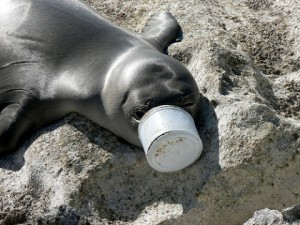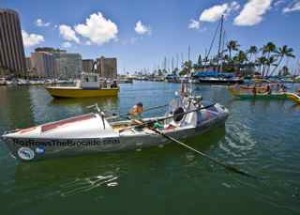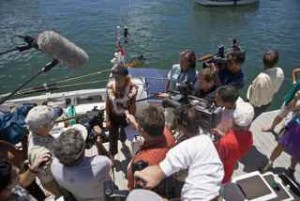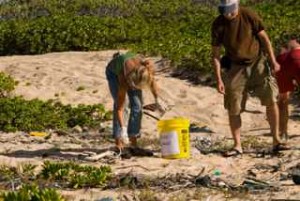
Today (Saturday) is Coastal Cleanup Day in California. Details available here.
If you don't live in California, or not even near a beach, that doesn't let you off the hook! Maybe you can go a short walk around your neighbourhood and pick up any trash that you see lying around. Even if you live miles from the ocean, trash blows into storm drains which lead to streams which lead to rivers which lead to the ocean....
So if we all do our little bit, we really can make the world a better (or at least cleaner) place!
|
|

I flew back to the mainland US yesterday, to a relatively chilly San Francisco, then headed north to Bolinas for a couple of nights. 99 days to make this journey east to west, 5 hours west to east.
And an incredible "small world" moment. My mother found herself on the same flight as Lt Stephen Baxter, the pilot of the USCG helicopter that airlifted a reluctant me from my boat last year. He and I have stayed in email contact since then, and I knew he had been in Oahu to help out after the tragic death of four of his colleagues in a helicopter crash. But for him and Mum to actually find each other on a huge plane... it was nearly as incredible as the meeting of the JUNK and the Brocade in mid-Pacific.
As I wake up this morning to a foggy day, Hawaii seems a long way away, metaphorically as well as geographically. But to bring back a ray of sunshine, Mum has been busy uploading some pics to SmugMug - check out these photos of my arrival in Waikiki on Sept 1, courtesy of photographer Phil Uhl.
Finally, a huge thank you to the Thompson sisters, Remi and Jamie, who helped me clean my boat and get her ready for storage in Hawaii before I left. And to Gary and Mike for managing the logistics of moving the Brocade around the island.
Also a swift but equally big THANK YOU to Ian Tuller who has loaned me his beautiful Mini Cooper convertible for the duration of my stay in the Bay Area. We had real fun on the bends on the way to Bolinas!
|
|

It struck me that my Pacific row is the perfect metaphor for how we as individuals are empowered to have a positive effect on the environment. We are so bombarded with bad news that it is easy to feel overwhelmed and helpless, that there is nothing we can do that will be more than a drop in the ocean, so to speak.
My journey from San Francisco to Hawaii took me approximately a million oarstrokes. I could have stood under the Golden Gate Bridge and told myself that one oarstroke would make no difference. But you put enough small actions together, and they add up to something truly significant. So by taking one stroke at a time, I have slowly but surely made my way across 2,600 miles of ocean to Hawaii.
Likewise, right now we are killing the earth by a thousand million cuts. We can turn this situation around, but people need to believe that their every single action counts. Every time they refuse a plastic bag and use a re-usable one instead, every time they buy organic, every time they walk instead of using the car, they are making a positive decision that will help save the earth.
And similarly, if you have a dream, if you want to change your life but can't see how to get from where you are to where you want to be, just take the first tiny little action that will put you on that path. Pick up the phone and make that call, go online and look for that new job, decide that today you will limit yourself to just the one cookie. You will rarely achieve a goal in a single quantum leap. More likely you will need to make many, many incremental steps towards your goal. Always keep your goal in mind, but don't focus on it. Focus instead on the present moment, and make sure that your moments are taking you in the right direction, and little by little you will get there.
One stroke at a time.
[photo by Phil Uhl]
|
|

Picking up trash off a beach may not be top of most people's lists of a fun way to spend a sunny afternoon, but I found it curiously addictive, and eminently satisfying.
Last Thursday, after the press conference at the Waikiki Aquarium (where my boat is on show until next Wednesday if you happen to find yourself in Hawaii), we jumped into a minibus and headed up to Oahu's North Shore.
The Kahuku Beach Cleanup was organized by Beach Environmental Awareness Campaign Hawai'i (B.E.A.C.H), whom I had first met when I was here last November. Suzanne and Dean are passionate activists, and spend their every waking moment educating, organizing and executing beach cleanups. They are ardent crusaders for the environment, and although it seems that sometimes they feel it is a lonely struggle, they are undoubtedly making a difference in a very real way.
A group of about 25 volunteers from several environmental organizations gathered on a secluded beach in Kahuku, accessible only through a locked gate on the Campbell Estate, or via a long walk along the beach.
Tons of junk, especially plastic, is attracted to this beach because of its location on Oahu. The currents bring the junk from Japan, Alaska, California and even from Honolulu, as it swirls along water streams in the ocean, around and around the Pacific.
I had, of course, seen the photographs of marine junk, but it was quite another thing to see it in reality. I was appalled to see the extensive drifts of plastic, and it was all I could do to restrain myself while Suzanne issued us with our instructions - my fingers were itching to start picking it all up. I wanted to scour the beach clean of trash. I was overwhelmed with the feeling that this was just Not Right.
But we weren't allowed to just pick up plastic indiscriminately. Each type of trash had to be collected individually so it could be counted and analysed, in an effort to understand the root causes of the pollution problem and address them at source. We were each given a pair of gardening gloves and a bucket marked with a label corresponding to each of the most common types of trash - Eel Cones, Oyster Spacers, Buoys, Bleach Bottles, Rope, Caps and so on. Then we were let loose on the trash.
I was collecting Oyster Spacers (long, thin tubes of plastic, used by Asian fishermen) and soon became obsessed by my foraging, rummaging through piles of debris. After just an hour I had filled my large bucket, and the other volunteers were doing likewise. After a couple of hours we were told to stop so the pickings could be sorted and logged. We had filled around 20 large black bags with plastic debris.
It was frustrating not to be able to leave behind an immaculate beach, but we had taken a major step in the right direction, and no doubt Suzanne and Dean will be back - for the sad truth is that there is plenty more trash where that came from.
There are clean-up campaigns all over the US and all over the world. If you want to organize your own effort, Suzanne and Dean are experts and would be happy to offer advice. Or to be put in touch with local organizations who perform cleanups, contact David Helvarg at the Blue Frontier Campaign, and he will be delighted to put you in touch with the right people.
If we pull together, we can make a world of difference!
[photo: David Helvarg of Blue Frontier Campaign and I at Kahuku Beach, photo courtesy of B.E.A.C.H.]
|
|